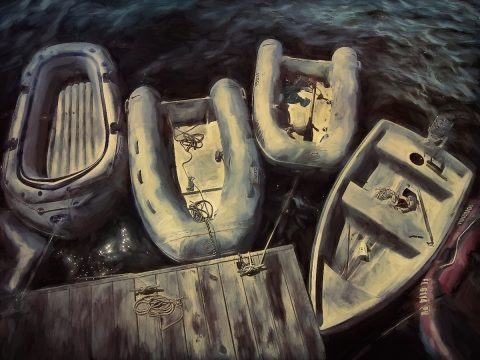The comic relief in the story really helps build the father’s character and the relationship between the son and the father. How did you balance the comedy with the character’s despondency about his various conflicts, including the loss of his father?
The kernel of this story (terrible pun intended … I’m so sorry) actually came from a conversation I had with my girlfriend while she made stovetop popcorn one night: A friend of ours was sick, and as we talked about this the popcorn started popping, getting louder and louder, almost like it was trying to butt into the conversation. That was just so amusing to me: two people trying to have a serious conversation over the rising-in-volume-and-intensity of popping popcorn. I wrote the first draft of this story the next morning. In that version, the father wasn’t dead; he was just this weirdo who wanders into his adult son’s room in the middle of the night mumbling about Orville Redenbacher, etc.—not really a story. Later, I came back to it and, lo and behold, the father was suddenly dead. He was much more interesting as a ghost—aren’t we all?—and things progressed from there.
To better answer your question regarding comic relief and the character’s despondency: I made a conscious effort not to allow the grief to become a punch line of the dark humor inherent in this situation, but I also made sure not to get rid of the humor out of some misplaced sense of respect for the character’s grief. For me, humor is hope, and I found it endearing that these two people—one dead, the other in the throes of deep pain—were still striving toward hope in small ways.
What is your favorite ghost story?
Two stories that aren’t actually ghost stories come immediately to mind, so I’m kind of cheating here: “Nirvana” by Adam Johnson (in which, among many other things, the main character creates a computer simulacrum of the recently assassinated president in order to bring some comfort to himself and the country/world) and “Stone Animals” by Kelly Link. I also used to devour anthologies of “true” ghost stories as a kid. I remember this book Haunted America in particular, which had at least one ghost story from every state in America.
But for me the most influential ghost story (and still one of my favorites) has to be one of the most classic: Dickens’s A Christmas Carol. My mother read it to me for the first time when I was five years old. She had this old copy illustrated by Arthur Rackham (with a goat-legged devil on the front) and I was so enthralled with it. I remember thinking a lot about poor Jacob Marley. Like many people, I couldn’t help but wonder: How come no one had intervened on Jacob’s behalf? Why does he have to carry around that ponderous chain for eternity? And of course at the end of the book Jacob doesn’t return. He’s gone, presumably still wandering the universe full of pain and regret with a billion other tortured souls. The poor bastard! That was so sad to me, but it was also quite moving: Despite the fact that no one had come to help him, Jacob still returned that foggy night to help his friend Ebenezer.
The father hovers, floats, shrinks, and expands. How do you think about characters’ movements in space and their interactions with their environments when you write?
How we interact with our environments/spaces definitely says a lot about how we feel there, and I thought about the father’s movements a great deal: He’s confused and hurt and scared and (to top it all off) freed from his own body. He can’t even eat the popcorn. And from the son’s perspective, how do you move around in a space with the befuddled spirit of someone you love? That was part of the fun with writing this: seeing how these two moved around each other.
What foods remind you of specific people in your life?
Some foods that quickly come to the top of my head: those little candies wrapped in strawberry-plastic remind me of my grandmother and grandfather. (I used to sneak into my grandmother’s sewing room and steal a couple.) Diet Coke reminds me of one of my cousins. One summer he was over at our house and I left a can of Diet Coke on the porch, then came back to it like an hour or two later, and, well, a bunch of ants had crawled into the can and drowned, which I only discovered upon taking a sip. I could go on and on.
This story is ultimately about grief, which encompasses love, pain, and a sense of absurdity. You hit all these notes in such a small space. What advice do you have for writers about developing a complex emotional experience in flash fiction?
Thanks so much, Victoria! That’s wonderful to hear.
I’m still pretty new to the world of flash fiction, but I guess my advice is to follow language rather than the story or your preconceived expectations about the story when writing. Language—a hyper-obsessive focus on language at the sentence level—will often create plot in much more interesting ways than any Plot-o-Matic part of your brain will. It will also complicate life for your characters.
Is the language telling you to let it snow inside a Pizza Hut basement in the middle of July while each drifting snowflake whisper-sings Chris Isaak’s “Wicked Game”? Well, consider letting the language have its way. In the end, there may be no story there—the creepy snow may have to go, Pizza Hut may have to go, all of it may have been nothing more than a weird distraction from the real story you were trying to scratch at—but that’s something you can figure out two, three, fourteen drafts from now. In the beginning, really let language jerk you around.



 The SmokeLong Grand Micro Contest (The Mikey) is now an annual competition celebrating and compensating the best micro fiction and nonfiction online.
The SmokeLong Grand Micro Contest (The Mikey) is now an annual competition celebrating and compensating the best micro fiction and nonfiction online.